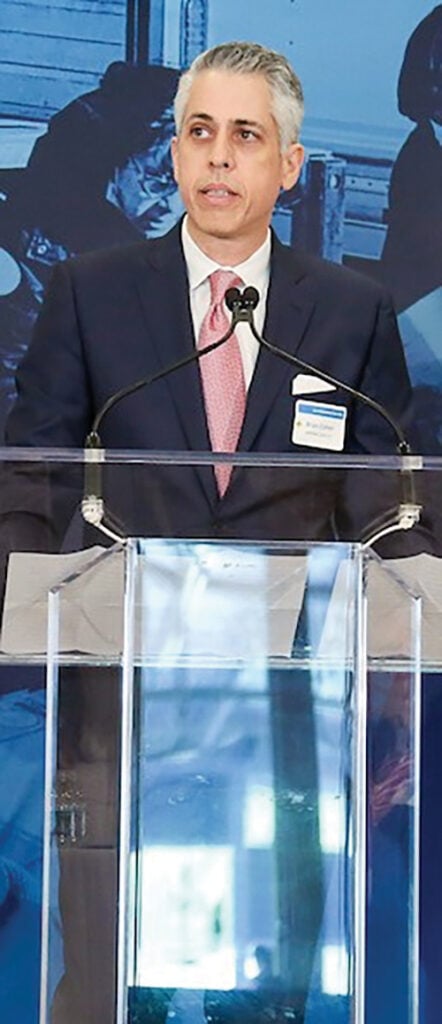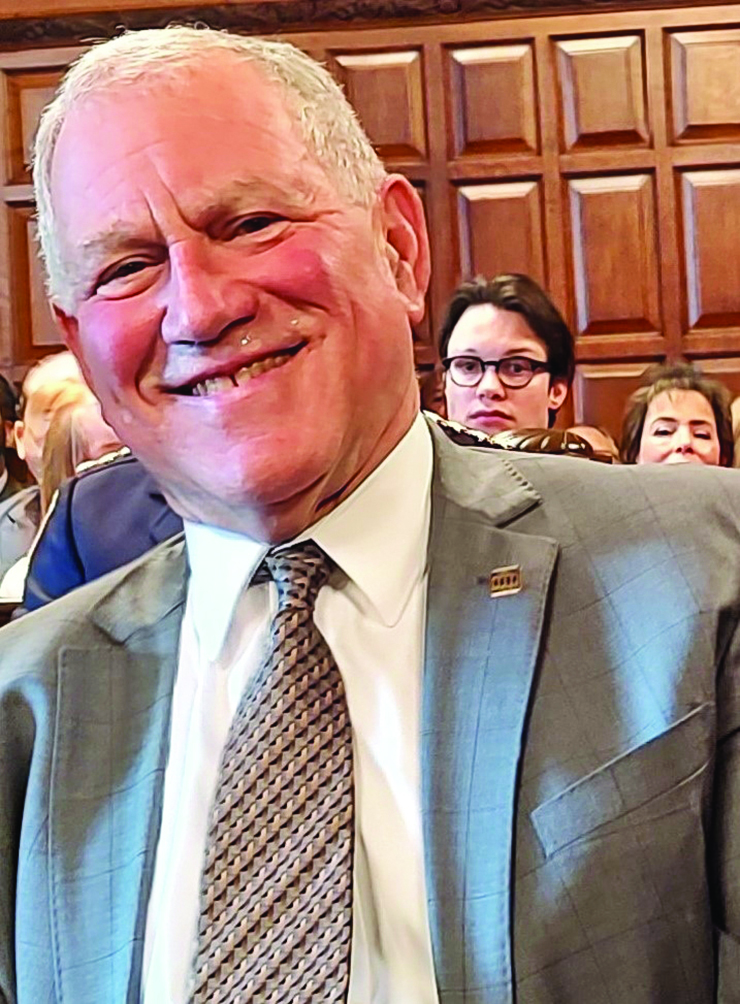
A task force to study antisemitic and anti-Asian hate crimes has been formed courtesy of the New York State Bar Association. The task force consists of four subcommittees. Six attorneys are on the subcommittee to determine possible statutory changes that could help the problem to reduce antisemitic and anti-Asian hate crimes.
The task force is co-chaired by Vince Chang, a partner with the Manhattan-based firm of Wollmuth Maher & Deutsch, specializing in litigation and dispute resolution. Also co-chairing is Rye Brook resident Brian Cohen, 50, a partner of Lachtman Cohen, a Westchester County-based firm. He serves on the board of UJA-Federation of New York’s Westchester Business and Professional Division and is a trustee of Temple Sholom, a Conservative congregation, in Greenwich, Connecticut.
“I’m inspired to do this by the Jewish value of tikun olam. I want to do my part to make our community safer for Jews. In doing so we can help others, meaning those who are perpetuating hate toward Jews gain a better understanding of who we are as a people,” Cohen told The Jewish Link. “If they [the haters] actually get to know us, spend some time with us, I think they will realize we’re just really good people who want the same thing as everyone else and I think we can turn a lot of people. We are very misunderstood and I want to do my part to change that.”

on May 11, 2022.
Better education in schools and at home as well as better state legislation are two possible antidotes to help stem the significant jump in hate crimes over the past several years, according to Cohen.
“Generally, I hope we will create initiatives that are going to lead to a sharp decline in antisemitism. We’re looking for legislation, education, those are the two primary areas. One of the things we’re going to do is examine the laws that are currently on the books and how they are enforced and see how we can improve what’s there now and areas where we can impose new legislation that will further cut down on hate crimes and antisemitism, including anti-Asian hate as well,” continued Cohen.
Sometimes antisemitism occurs from within one’s own religious circles as a culture and ethnic entity.
“We’re going to educate on what antisemitism is. We, as a people, need to be more unified. There are all different walks of Judaism. You have everyone from Reform to ultra-Orthodox. We would be stronger and even more well-equipped to fight antisemitism if we can sort of find that common thread that runs through all of our communities. Jews need to support each other,” Cohen concluded.
Six attorneys are probing problems with reporting hate crimes and steps that could be taken to improve reporting. Five attorneys are looking into the effectiveness of law enforcement that New York has in combating hate crimes. Seven attorneys are taking on the education system by diving into efforts to improve anti-bias and anti-bullying in education, particularly elementary through high school.

The chairwoman of the Senate Education Committee, Shelley Mayer (D-Yonkers, Westchester County) opted not to be a member of that subcommittee. Instead, she chose problems with reporting hate crimes and steps that could be taken to improve reporting as well as the effectiveness of law enforcement in New York in the hate crimes field.
“I’m interested in making sure that people who are subject to this overt or even subtle antisemitism or anti-Asian violence know that there is something that protects them. That’s my concern about the law.” Mayer, 71, told The Jewish Link. “It’s how the law defines it and we capture conduct that the person on the receiving side perceives as antisemitism or anti-Asian hate. If there is conduct that is not captured by the law, that’s my interest in making sure that people feel the law is responsive to their experience. If you’re afraid because you’re Jewish or you appear to be Jewish by your clothes or your hair wear or something else, even if it doesn’t rise to the level of a crime currently it’s perceived as antisemitic and it ought to be and it ought to capture that somewhat. The task force is made up of a diverse group, which is good. I was asked by the head of the Westchester Human Rights Commission to be a part of it and I’ll do my best to contribute.”
John Harris, a litigation partner with the Manhattan-based firm of Frankfurt Kurnit Klein & Selz, signed up for a subcommittee focusing on problems with reporting hate crimes and steps that could be taken to improve reporting. Harris has also been involved with the ADL for the past 30 years.
“I’ve been involved in fighting antisemitism and other forms of hate ever since the Crown Heights riots [in mid-August 1991]. That’s what sort of drew me into the issues. The recognition that hatred between groups was not very far from the surface,” Harris, 66, told The Jewish Link. “It is true that it has advocated for hate crimes protection for laws that enhance penalties for crimes that involve the act of hatred. I actually like a number of things about this task force. It’s devoted not just to antisemitism but also to what I think of as a cousin, hate against people of Asian and Pacific Islander descent. I also think that having a group of lawyers who know how courts and agencies have been dealing with these issues of antisemitism can help this group maybe come up with an identification of problems and an identification of solutions that a nonlegal organization like the ADL might not be as aware of.”
A native of Saint Paul, Minnesota Harris lives in Scarsdale, New York and affiliates with the Westchester Reform Temple.
Richard Lewis, who engineered this task force, is president of the New York State Bar Association. “It’s clearly a problem,” he said. “With the growth in the number of incidents it’s becoming a crisis. It really is something that is underreported and frequently gets diluted. Anti-Asian and antisemitic issues get pushed to the background and do not get the type of attention that the issues merit. Hopefully, more attention to them would allow the hate crimes to be confronted by law enforcement and by legislative action.”
Lewis had more to add to the reason why this task force is necessary when so many other groups and organizations are focused on the same issue.
“I don’t know that we will be able to solve the problem,” Lewis told The Jewish Link. “I use the analogy of a rape victim. People listen to these stories and they smile or women hear a lewd joke or something and they sort of look the other way but it does tend to grow. Obviously, as you push the boundaries more and more the potential for more serious inaction of dislike or hatred can come out. Antisemitism has been around from the beginning [of time]. What we would like to do is point out that the issue is there. It’s not something that disappeared. There are a lot of people who think that antisemitism and anti-Asian hate is not a problem. Well, it is a problem. We want to point out that it is there.”
Lewis, 75, a Binghamton, New York resident, wants to take on the education system where the evils of hate can be mitigated through learning what not to do.
“I want to say there are issues in the schools. There are issues in other areas that have resulted in this type of activity, this type of hatred. We need to confront those issues and those origins,” Lewis said. “I hope we would get to the power sources including the legislature to review hate crime laws, for example. To review the way things are handled in schools. Is the Holocaust being taught and if so, is it just a quick run-through or are they really talking about the horrors of the Holocaust? What we need to do is to first isolate some of the causes of the present issue, not just the historical issue. [We want] to hopefully come up with some potential ideas for solutions and then to take it to the power sources and say, ‘Look. What are you going to do about this? We have suggestions for you. I understand that you can’t necessarily arrest somebody because they said something. When they start to act out in a fashion that is aggressive or violent, now we’re talking about something entirely different.’”
Cohen noted that in 1964, Justice Potter Stewart tried to explain “hard-core” pornography, or what is obscene, by saying, “I shall not today attempt further to define the kinds of material I understand to be embraced … but I know it when I see it.”
“You know it when you see it in instances when it’s obvious but then there are forms of antisemitism that are a little more subtle and we need to educate about that as well,” Cohen said. “It’s not that we’re looking to change the definition, we’re going to educate on what antisemitism is.”
There are 19 subcommittee members. Five of the 19 lawyers signed up to be on two subcommittees. Eight of the 19 attorneys identify as being Jewish. The Bar Association is expected to release its final report in January 2024.








